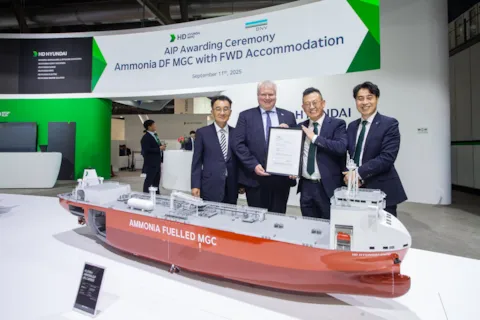DNV awards HD Hyundai Mipo AiP for Ammonia Dual-Fuel Medium Gas Carrier with forward accommodation
DNV has awarded an Approval in Principle (AiP) to HD Hyundai Mipo Dockyard (HD HMD) for an ammonia dual-fuel medium gas carrier (MGC) design featuring a forward accommodation layout. The AiP was presented to Mr. D.J. Lee, Executive Vice President / Head of Initial Design Division & Detailed Design Division at HD HMD, Vidar Dolonen, Regional Manager for Korea & Japan at DNV, during a ceremony at Gastech 2025.
The vessel concept relocates the crew accommodation block to the fore section, providing new flexibility and additional useable space on board - enabling the application of environmentally friendly technologies, such as carbon capture and storage units, alternative fuels, or other energy efficiency or emission reduction solutions. This design also realizes sufficient space for installing an ammonia dual-fuel propulsion system and carbon capture equipment, while providing flexibility for integrating future technology solutions to comply with shipping’s rapidly evolving environmental regulations.
Mr. D.J. Lee, Executive Vice President / Head of Initial Design Division & Detailed Design Division at HD HMD, added: “This innovative design reflects our commitment to delivering solutions that address customer needs and global sustainability targets. Working with DNV, we aim to accelerate the adoption of next-generation technologies for a greener maritime industry.”
Vidar Dolonen, Regional Manager for Korea & Japan at DNV, said: “One of the challenges associated with alternative fuels and energy efficiency enhancing technologies is optimizing design for the space required for onboard installation. As the energy transition gathers momentum, we are seeing innovators like HD Hyundai Mipo see where they can try to optimize designs to maximize the economic potential of a vessel, while giving owners the flexibility to utilize the last in green solutions. We are very pleased to award this AiP to HD Hyundai Mipo and look forward to a productive and deepening cooperation.”
An Approval in Principle (AiP) is an independent evaluation of a concept based on a predefined framework of requirements. It confirms the feasibility of the design and ensures there are no significant technical obstacles hindering its implementation.
